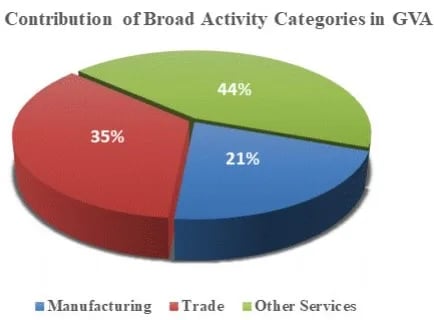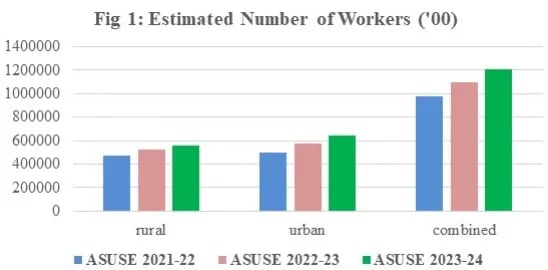Syllabus: GS3/ Economy
Context
- The Ministry of Statistics and Programme Implementation (MoSPI) has released the Annual Survey of Unincorporated Sector Enterprises (ASUSE) for 2023-24 for the reference period October, 2023 – September, 2024.
Coverage of ASUSE
- Geographical coverage: ASUSE covers the rural and urban areas of the whole of India (except the villages in Andaman and Nicobar Islands).
- Sector-wise, this survey captures unincorporated non-agricultural establishments belonging to three sectors viz., Manufacturing, Trade and Other Services (excluding construction).
- Economic characteristics: Number of workers, GVA, emoluments paid, fixed asset owned, outstanding loan etc.
Key highlights from the ASUSE 2023-24
- Growth in Establishments: The total number of establishments in the sector increased substantially from 6.50 crore in 2022-23 to 7.34 crore in 2023-24, representing a 12.84% growth.

- The Gross Value Added (GVA), a key indicator of economic performance, rose by 16.52% driven by a 26.17% growth in other services sectors.
- Gross Value Added (GVA) per worker, a measure of labour productivity of the sector, rose to Rs. 1,49,742 in 2023-24 from Rs. 1,41,769 in 2022-23 in current prices showing a 5.62% increase.
- Productivity Metrics: The Gross Value of Output (GVO) per establishment increased from Rs. 4,63,389 to Rs. 4,91,862 in current prices.
- Strong Labour Market Performance: The percentage of female-owned proprietary establishments has increased from 22.9% in 2022-23 to 26.2% in 2023-24.
- The average emolument per hired worker also increased by 13% in 2023-24 compared to the previous year, signaling improvements in wage levels.

- Better Digital Penetration: Percentage of establishments using the internet has grown significantly from 21.1% in 2022-23 to 26.7% in 2023-24.
Concluding remarks
- The data serves as a key input for policymaking, supporting National Accounts Statistics, fulfilling the requirements of Ministries such as M/o Micro, Small and Medium Enterprise (MSME), Textiles, Labour & Employment, and empowering stakeholders to make informed, data-driven decisions.
Source: PIB
Previous article
Ken-Betwa River Linking Project
Next article
U.S. and China Renew S&T Agreement